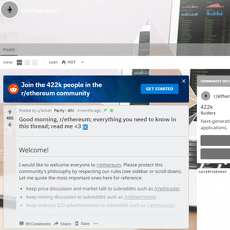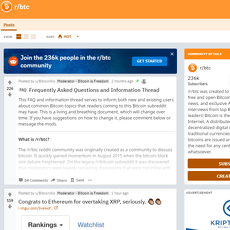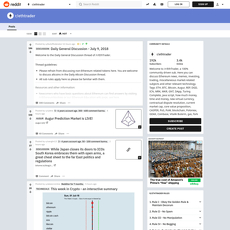r/Bitcoin Review
r/Bitcoin
www.reddit.com
r/Bitcoin (Reddit) Review & Guide: Everything You Need To Know + FAQ
Is r/Bitcoin actually worth your time—or just another noisy corner of Reddit? If you care about staying sharp on Bitcoin news, security, fees, and what the Bitcoin crowd really thinks, you’re in the right place. I’ve spent years watching what works (and what wastes time) on that sub. Let’s cut the fluff and set you up to get real value fast.
Why r/Bitcoin feels hard to use at first
Lots of newcomers hit r/Bitcoin and bounce. Not because the content is bad—because the signal hides behind rules, culture, and a firehose of posts.
- Strict rules trip people up: Post a low-effort price take or beginner question in the main feed and it’s gone in minutes. It’s not personal—the sub is strict by design.
- Flood of content: On busy days, dozens of posts can hit in an hour. If you don’t sort right, you’ll miss the best stuff.
- Scammy replies and fake “support” DMs: When you ask for help, bots and scammers often show up first. Real support won’t DM you first.
- Fees and confirmations confuse even smart people: On-chain fees spike during hype (think Ordinals/Runes surges). Without a sense of mempool conditions, you can overpay or wait forever.
- Price talk is corralled into megathreads: If you don’t know where those live, your posts get removed and you get frustrated.
To make it trickier, Reddit’s ranking can create a “herding” effect. In a well-known randomized experiment on Reddit, researchers found a single early upvote could meaningfully boost a post’s final score (Muchnik, Aral, Taylor, Science, 2013). Translation: if you rely on the default feed, you’ll often see what got lucky early—not what’s most useful.
And yes, the scams are real. A classic pattern:
Fake helper: “Hey friend, I’m with Ledger/Trezor support. I can fix your stuck transaction. Send your seed or connect here.”
Hard rule: Never share your seed phrase. No legit wallet team will DM you first. Period.
What I’ll help you do
I’ll show you exactly how to make r/Bitcoin work for you—without wasting time:
- What to read first so you don’t get removed or ignored
- How to sort and search to surface real signal fast
- How to spot scams (and stay safe when asking for help)
- Where to find solid info on price, fees, security, and education—quickly
- Simple posting tactics that get thoughtful replies instead of downvotes
I keep this practical and no-nonsense. Expect examples, trusted sources, and clear steps you can use immediately.
Who this guide is for
- Beginners who want signal over noise and don’t want to get burned by comment-section “advice.”
- HODLers who want a clean stream of real Bitcoin news and security updates.
- Builders, devs, miners who appreciate technical threads and verified sources.
- Traders who need quick links to live data and fee conditions—without the hype.
Not here for altcoin picks or “next 100x” chatter? Good. You’ll feel right at home. If you are, you’ll feel like you’re swimming upstream.
Ready to stop guessing what belongs on r/Bitcoin and start using it like a pro? Up next, I’ll show you exactly what the sub is—and what it isn’t—so you don’t waste a single post. Want the fast pass to fewer removals and better replies?
What r/Bitcoin is (and isn’t)
Bitcoin-only focus and culture
r/Bitcoin is exactly what it sounds like: Bitcoin-only. It’s not a catch-all crypto forum and it’s not where you go to pitch the next token. The sub favors education, code, history, and security over hype. If you show up with low-effort price takes or off-topic shilling, expect to get filtered fast.
There’s a clear ethos here—self-custody, skepticism, and proof. You’ll see people ask for sources, code, or receipts. That’s not gatekeeping; it’s how the sub tries to protect newcomers from bad info and scams. Post “free BTC giveaway,” get banned. Share a thoughtful breakdown of a new wallet feature with links to the repo and release notes, get upvoted.
“Don’t trust, verify.”
That one line captures the mood. If you’re used to influencer culture and DMs from “support,” this place will feel strict. If you care about real signal—updates from core devs, fee reality checks, and practical security—you’ll feel right at home.
Concrete example: if you ask “Is this new hardware wallet reputable?” and link the official docs, the community will dissect firmware policies, supply-chain risks, and whether the team has a history of disclosing vulnerabilities. You’ll get answers, but they’ll be evidence-first.
What you’ll see in the feed
The daily mix skews practical and verifiable. Typical threads look like this:
- Timely news with sources: ETF flows, halving effects, difficulty adjustments, or court rulings—usually linked to primary sources or reputable outlets.
- Mempool and fee updates: Screens from mempool.space, tips on fee selection, RBF/CPFP questions, and “why did my tx get stuck?” threads when the backlog surges.
- Security alerts: Phishing waves, compromised wallets, fake app warnings, firmware updates from major hardware makers, and PSAs on supply-chain risks.
- Dev notes and proposals: Bitcoin Core release posts, review clubs, BIP discussions, Lightning updates, and links to meeting notes or GitHub PRs.
- Regulatory headlines: Concise summaries with links to filings, hearings, or on-chain responses when relevant.
- Historical and educational posts: Satoshi-era emails, Pizza Day retrospectives, UTXO explainers, and privacy basics that get resurfaced for newcomers.
- Memes—sparingly: They exist, but they’re not the core of the sub. Expect more signal than sugar.
- Sticky threads: Price and beginner content usually lives in megathreads to keep the main feed clean and searchable.
When fees spike or price swings hard, activity jumps and the top of the sub gets very data-driven—fee charts, node stats, and sober risk talk. That aligns with what research has found about social forums and markets: attention and sentiment push volume and volatility. If you’re curious, see studies like “Do Social Media Sentiments Matter in the Cryptocurrency Market?” (SSRN) and “Cryptocurrency Price Prediction Using News and Social Media Sentiment” (arXiv). Translation: big Reddit days often coincide with big market days—so keep a cool head.
Example of a high-signal post you’ll actually see: “Bitcoin Core 27.x released — here’s what changed and how to verify the binary,” with checksums, PGP signatures, and links to the official release page. Example of a post that gets filtered: “Will BTC 100x this month???” with no sources. The difference is obvious—and enforced.
Who will feel at home here
- Self-custody doers: People who use hardware wallets, verify downloads, and want best practices (not shortcuts).
- Builders and tinkerers: Devs, node runners, Lightning explorers, and anyone who cares about how things actually work.
- Long-term thinkers: HODLers looking for education and credible news over dopamine hits.
- Curious beginners with respect for the rules: If you’re willing to read a bit before posting, you’ll get real help.
Who probably won’t vibe:
- Altcoin hunters: This isn’t the place for token picks, airdrops, or “next 100x.”
- Referral pushers and “support” DMs: You’ll be flagged instantly.
- Pure price-only posters: Take it to the megathreads—there’s a system for that.
If the idea of holding your own keys makes you feel both empowered and a little nervous, you’re in the right place. If you want quick answers without reading the room, you’ll get humbled. That’s part of the value—the bar is set high on purpose.
Want your posts to stick and actually get replies? In the next part, I’ll show you the exact house rules, flairs, and megathreads that keep r/Bitcoin useful—and the common mistakes that get people removed in under a minute. Ready to post smarter?
Rules, flairs, and megathreads: how to avoid getting removed
“Clarity is kindness—especially on Reddit.” If you want your post to stick and actually help people, play by the house rules. The sub is welcoming to thoughtful contributors, but it’s ruthless with noise. Reddit’s own transparency reports show moderators remove millions of spammy or policy-breaking posts across the site each year, and r/Bitcoin is no exception. Here’s how I keep my posts alive and my comments visible.
Read the sidebar and wiki first
Five minutes here can save you hours of frustration. The essentials:
- Rules page: Start with the official list: r/Bitcoin/about/rules. You’ll see what gets auto-removed, what needs sources, and where price or beginner content belongs.
- Wiki & FAQs: The sub’s wiki is surprisingly useful: r/Bitcoin/wiki/index. It points you to fee estimators, security guides, and trusted references—perfect to cite in your posts.
- Beginner lane: If your question is 101-level (wallet choices, how fees work, stuck tx), the safer bet is the beginner thread or r/BitcoinBeginners. Posting basics outside those lanes gets removed fast.
Pro tip: If your post disappears, check your inbox for an AutoModerator message. It usually explains the rule you tripped. Fix it and resubmit, or politely use modmail with evidence.
Flairs, tags, and formatting
Using the right flair is the difference between “thanks for sharing” and “removed for off-topic.” Match your content to the sub’s structure:
- News: Breaking or notable updates.
Example title: “SEC publishes new Bitcoin custody guidance (PDF)”
Body basics:- Link to the primary source (press release, PDF, official site).
- 2–3 bullet points summarizing why it matters.
- Optional: link to coverage, but lead with the original doc.
- Discussion: Thoughtful takes or questions that aren’t beginner/basic.
Example title: “Should fee market pressure change wallet default settings?”
Body basics:- Your thesis in 2–3 bullets.
- At least one reputable source (e.g., mempool.space, Bitcoin Core release notes).
- A clear question inviting input.
- Technical: BIPs, PRs, client behavior, mempool mechanics.
Example title: “BIP-XYZ status update and implications for hardware wallets”
Body basics:- Link to the BIP or PR on GitHub or BIPs repo.
- Plain-English summary of what changed and why it matters.
- Call out risks, edge cases, or testing notes.
- Question: Use this for non-beginner questions that don’t fit a megathread.
Example title: “How should I RBF a 120 vbyte tx with current mempool congestion?”
Body basics:- Context: wallet type/version, OS, privacy considerations.
- What you’ve tried and what happened.
- Never share seed phrases or private information. Redact screenshots.
- PSA/Guide: Security warnings or how-tos with proof.
Include hashes, official links, and steps users can verify themselves.
Formatting that helps you pass AutoMod and human scrutiny:
- Use sources in the first paragraph. Unverified claims and naked screenshots get nuked.
- Avoid clickbait titles. State the fact, then the significance.
- Explain images (charts, mempool screenshots) in one or two lines: what we’re seeing and why it matters now.
- Redact addresses, order IDs, or any personal info.
- No link shorteners, referral parameters, or tracking junk.
Megathreads you should know
r/Bitcoin corrals repetitive or high-volume topics into stickied megathreads—usually pinned to the top of the sub. Post there to get engagement and avoid automatic removal.
- Price/Market Thread: Anything like “Is now a good time to buy?”, “We hit $X!”, or short-term TA belongs here. You’ll get more eyes and fewer flags.
- Beginner Q&A: Wallet picks, first hardware wallet setup, “why’s my tx pending?”—these fit perfectly and get faster, kinder help.
- Daily/News Roundups: If your link is a smaller headline, add it here with a one-line summary and the source.
- Event threads: ETF decisions, protocol releases, network incidents—the mods usually open a live thread. Posting outside it risks removal as a duplicate.
What goes where—quick examples:
- “Why are fees spiking right now?” → Price/Market or Daily Discussion with a link to mempool.space.
- “Ledger vs Trezor for long-term cold storage?” → Beginner Q&A (or r/BitcoinBeginners).
- “Bitcoin Core 27.0 pre-release testing notes” → Technical post with release notes link.
- “My 1-sat/vB tx is stuck—what now?” → Beginner/Daily thread with wallet version and whether RBF is enabled.
What gets removed or downvoted
The moderators and community have a high bar. If you post any of the below, expect a swift removal or a wall of downvotes:
- Altcoin/NFT content or chain wars—wrong sub.
- Referrals, promo codes, airdrops, giveaways, surveys, or “support DMs.” Also, anyone asking for your seed or offering to “recover” funds—report and move on.
- Clickbait and sensational price calls: “100x this week,” “$1M by Friday,” “Emergency!!”
- Unverified claims with no source, or screenshots with suspicious edits.
- Duplicates of the top sticky or megathread. If it’s already pinned, post there.
- Paywalled links with no summary. If you must share, add a useful summary and a primary source.
- Low-effort memes or one-liners outside threads that allow them.
Two-minute pre-flight before you hit Post:
- Did I match the right flair and include at least one primary source?
- Is there a megathread this obviously belongs in?
- Title states the fact; body adds value—no hype, no referrals, no shorteners.
- Images redacted, links verified, context included.
“On Reddit, the fastest way to be heard is to respect the room.”
Want your feed to surface the good stuff automatically—breaking posts, real technical threads, and clean fee insights—without swimming through noise? In the next part I’ll show you the exact sorting, search filters, and scam-spotting tricks I use every day. Ready to make r/Bitcoin high-signal?
Turn r/Bitcoin into a high-signal feed
Reddit can feel like standing under a firehose. The trick isn’t to drink faster—it’s to aim the nozzle. With a few tweaks, r/Bitcoin turns from noisy scroll to a clean stream of verified news, fee updates, security tips, and thoughtful threads you can act on.
“Not your keys, not your coins.” — and not your filters, not your signal.
Sorting and search that actually works
Use the built-in tools like a pro and you’ll see the best stuff first, every time.
- For breaking news: Sort by New during busy windows (regulatory headlines, mempool spikes, major releases). I keep “New” open when blocks are slow and fees are moving.
- For vetted signal: Sort by Top → Today or Top → Week. This surfaces posts that survived moderation, time, and voting. Great for catching deep technical explainers you missed in the moment.
- Search like you mean it: Use the subreddit search with filters. Examples you can click:
- flair:Discussion fees (Top, Week)
- flair:Technical mempool (New)
- url:mempool.space (Top, Month) to find fee and congestion analyses
- author:sipa OR author:achow101 for posts/comments by well-known contributors
- Save your searches: On desktop, run the query and bookmark it. I have quick-access bookmarks for “Top Week Technical,” “New Discussion fees,” and “url:mempool.space.” It’s a 5-second routine that saves hours.
Pro tip: If the flair filter feels flaky, add the word to your query (e.g., “flair:Technical miniscript”). You can also combine with time filters (Today/Week/Month) to reduce junk.
Spotting scams in posts and comments
Scammers adapt fast, especially when fees spike or price runs hot. Your default stance should be “report and move on.” A few hard rules:
- Ignore DMs from “mods,” “support,” or anyone offering help. Real moderators won’t DM you. If someone messages “Your post violates rule X, verify here,” it’s a scam.
- No one legitimate needs your seed phrase, ever. Not screenshots. Not “last 4 words.” Not “view-only” versions. Zero exceptions.
- Watch for fake wallet “fixes.” Posts/comments that link to “recovery portals,” “airdrop claims,” or “ordinals tools” are common traps. Check domains carefully and don’t install random binaries.
- Be wary of price “giveaways.” Doubles, rare mints, or “first 100 get X sats” = instant report.
- Turn off unsolicited chats. Settings → Privacy & Safety → only allow messages from people you follow (or block chat requests entirely).
The data backs up the caution. The U.S. FTC has repeatedly warned that social media is a top source of initial contact for crypto scams, and “support impersonation” is a common hook. If a stranger is rushing you, it’s on purpose. Slow is safe.
Fast checklist: Suspicious link? Hover. Suspicious account? Click the profile and check history. Suspicious claim? Search the sub for the domain or phrase. When in doubt: report, don’t reply.
Security basics they won’t spoon-feed you
r/Bitcoin rewards people who take self-custody seriously. Here’s the short version of what actually keeps you safe:
- Self-custody: Move long-term holdings to a wallet where you control the keys. Hardware helps reduce mistakes. If you’re new, keep it simple: generate your seed offline, write it on paper or steel, and test a restore before loading meaningful funds.
- Seed hygiene: Never type your seed into a website. Don’t store it in cloud notes or photos. Consider a passphrase for a second “factor” if you understand the trade-offs—write it down separately.
- Verify downloads and sources: If you use Bitcoin Core, download from bitcoincore.org and verify the signatures. Only get wallet apps from official sites or known repositories.
- Fees and timing: Check congestion on mempool.space and use Replace-By-Fee (RBF) when available. If fees are volatile, send a small test transaction first.
- Address hygiene: Use a fresh address each time. Label your UTXOs if your wallet supports it. Double-check the copied address to avoid clipboard hijackers.
- Device safety: Keep a clean, updated OS. Don’t install random wallet plugins. If you go advanced, consider an air-gapped signer or a dedicated device for Bitcoin tasks.
Reality check: You won’t get personalized tech support here (and that’s a good thing). But if you share a general setup and ask a targeted question, the community is excellent at flagging risky tools and pointing you to better practices.
Sources the sub tends to trust
When a claim is big, r/Bitcoin asks for receipts. Save these and you’ll move faster than 90% of the feed:
- Primary and dev sources
- bitcoincore.org for releases and docs
- Bitcoin Core on GitHub and BIPs repo
- Bitcoin Optech for weekly technical updates and PR summaries
- Explorers and fee tools
- mempool.space (recommended fees, mempool state, RBF/CPFP visibility)
- blockstream.info and oxt.me for additional views
- Wallet safety and builds
- WalletScrutiny to check reproducible builds and security notes
- Macro dashboards and on-chain context
- Clark Moody Dashboard for a clean, data-rich snapshot
One more habit: cross-check before acting. If a post claims a protocol change, a critical bug, or a dramatic fee shift, confirm on at least one primary source above. Quick verification beats quick regret.
If you set up your filters, dodge the traps, and lean on solid sources, the sub becomes a daily edge. Now, what if you want better replies when you ask something—or you want your own posts to actually get traction? I’ve got a simple template and a few tricks next that consistently turn questions into useful answers… ready to use them?
Learn smart, post smart: getting value and giving value
I get it—posting in r/Bitcoin can feel like walking onto a stage where everyone knows the script but you. Here’s how to ask better, share better, and actually get signal back. The goal is simple: save time, get real answers, and add value without getting torched.
“The quality of your questions determines the quality of your answers.”
How to ask questions that get real answers
Strong posts are specific, show context, and live in the right thread. If you want useful replies, make it easy for people to help you.
- Be specific: Replace “Wallet won’t send” with “Electrum 4.5.3 on Windows 11 showing ‘insufficient fee’ for a 192 vB tx.”
- Add context: Wallet/app name and version, OS/device, approximate amount, priority/urgency, what you already tried. Redact any sensitive info.
- Include checkable details: For fees, include a mempool snapshot (e.g., mempool.space), your target confirmation window, and whether you can use RBF/CPFP.
- Post in the right place: Price talk and beginner questions usually belong in their sticky megathreads. That’s where the helpful people hang out.
- Show you’ve tried: One line of what you tested filters in the best helpers fast.
Bad ask: “Help! My BTC is stuck.”
Good ask: “Sent 87k sats from BlueWallet (iOS 6.5.2) with ‘economy’ fee ~8 sat/vB at 14:30 UTC. It’s 1-input/2-output (≈160 vB). mempool.space shows 20–25 sat/vB for next-block. RBF is available. Should I bump or wait ~4–6 hours? Any risk to cancel?”
Why this works: research shows that clear questions invite more engagement and better answers. If you like receipts, this piece from HBR explains why asking specific questions boosts quality replies: The Surprising Power of Questions. And while it’s for programmers, Stack Overflow’s guides on how to ask and minimal reproducible examples map perfectly to Bitcoin support posts.
Common beginner topics that do well
Some questions get consistently thoughtful answers because they’re practical and repeatable:
- Fees and confirmations: Great when you include tx size (vbytes), current fee ranges, and urgency.
Sample title: “Is 20–25 sat/vB enough for confirmation today if I can wait ~3 blocks?” - Wallet choices (self-custody focus): People love comparing hardware and mobile options, especially with requirements.
Sample title: “Best beginner-friendly hardware wallet under $150 with coin control?” - Self-custody setup: Backups, seed storage, passphrase strategy, and recovery practice get high-quality replies when you explain your plan.
Sample title: “Single-sig now, 2-of-3 later—what’s the cleanest path without locking myself out?” - Privacy basics: Address reuse, change outputs, coin control, and avoiding leaks.
Sample title: “Address reuse mistake—how bad is it and what should I change first?” - Bitcoin history: Halvings, blocksize era, scaling choices, or key protocol upgrades.
Sample title: “Why do many still quote 6 confirmations—historical norm or still best practice?”
Topics that flop: “Should I buy now?”, “Will price hit X by Friday?”, and “DM me support.” Keep it practical and you’ll pull in the right crowd.
Template for a solid discussion post
Here’s a copy-paste format that works. It signals effort, invites debate, and gives people something to react to.
- Title: Make it specific and neutral. “RBF vs CPFP for time-sensitive payments: which is safer (and when)?”
- My take (bullets):
- RBF feels cleaner if sender controls the wallet and can safely rebroadcast.
- CPFP is useful when you’re the receiver and need to accelerate without sender’s help.
- Both add fee complexity if your wallet doesn’t expose the right knobs.
- Sources: 1–2 reputable links (core docs, respected explorers, long-standing dev posts).
- Question: “What edge cases am I missing? Any wallet UX that makes one strictly better?”
Before (weak): “How do I unstick a transaction?”
After (strong): “Stuck tx at 9 sat/vB, BlueWallet shows RBF. Receiver can’t help. Would you prefer RBF bump to 25 sat/vB or CPFP from a change output? Any downsides to RBF on some exchanges?”
Use the proper flair (Discussion/Question/Technical), add 1–2 credible links, and avoid clickbait titles. Threads framed like this tend to earn thoughtful pushback instead of knee-jerk takes.
AMAs and verifications
Claims are cheap. Proof is not. When someone shows up as a dev, CEO, or researcher, look for hard signals:
- Mod confirmation: A moderator comment or special flair indicating the person has been vetted for that AMA. If it’s not in the thread, ask for it—politely.
- On-chain or cryptographic proof: A signed message from a known Bitcoin address, or a PGP-signed note that links their identity to a domain/GitHub they control.
- Cross-platform consistency: Does their Reddit handle match their GitHub/Twitter/website bio? Are there longstanding commits or publications to back it up?
Quick checklist for you:
- Don’t trust DMs or Telegram invites claiming “support.”
- Ask for a mod note and a verifiable signature if the claim matters.
- Never share your seed phrase—not in public, not in private, not ever.
- If it feels off, report and move on.
Want straight answers to the daily questions—fees, confirmations, prices, and the exact links I check before making a move? How much is $1000 in BTC actually worth right now, and what fee should you pick today? Keep going; I’ve got the no-BS FAQ up next with live resources you can bookmark.
r/Bitcoin FAQ: straight answers and useful links
How much is $1000 Bitcoin in US dollars today?
If you hold $1,000 worth of BTC, it’s roughly $1,000 until you trade it (minus any platform fees and spreads). If you’re asking “What’s 1,000 BTC in USD?”, that’s a massive sum that changes every second—use a live converter, not screenshots.
- Quick check: I use the Kraken BTC/USD converter because it updates in real time and shows the live order book price.
- Heads up on spreads: The “mid price” isn’t always what you get on an exchange. The executed price can be slightly higher or lower depending on liquidity and order type.
Example: If BTC trades at $60,000, then 1,000 BTC is about $60,000,000. Simple math, but always confirm with a live source right before you act.
How much is a $1000 bitcoin transaction fee?
On-chain fees aren’t a percentage of the amount. They depend on two things: the fee rate (sats/vB) you choose and your transaction size (vbytes). Wallets estimate this for you, but here’s how to think about it.
- Check current fee rates: Open mempool.space and look at Low/Medium/High priority in sats/vB.
- Know your rough size: A typical 1-input, 2-output SegWit spend is ~140 vB. Legacy can be 2x that. Taproot key-path spends can be smaller.
- Do a quick estimate: Fee ≈ sats/vB × vB size. If mempool shows 25 sats/vB and your tx is ~140 vB, that’s ~3,500 sats (0.000035 BTC). If BTC = $60k, fee ≈ $2.10. Numbers change constantly—this is just the method.
- Two fees to separate: If you’re buying/selling in an app, you’ll also pay the platform’s trading fee (often percentage-based). That’s separate from the Bitcoin network fee.
Pro tip: If your wallet supports Replace-By-Fee (RBF), you can bump a stuck fee later. For incoming stuck transactions, Child-Pays-For-Parent (CPFP) can help.
How many confirmations do I need?
Every confirmation is one block added on top of your transaction. Average block time is ~10 minutes, but it’s variable. What’s “safe enough” depends on the risk and amount.
- Everyday use / smaller amounts: 1–3 confirmations is common.
- Exchanges: Most require 1–6, depending on policy and the asset (BTC is usually on the lower end).
- Larger transfers (business/treasury): 6 confirmations is the classic standard.
- Instant needs: On-chain zero-conf is risky. For instant finality, use Lightning or wait for at least one on-chain confirmation.
Risk shrinks exponentially with each confirmation (that’s straight from the original design). If you want the math behind it, check the whitepaper’s double-spend analysis.
Where should I post price talk?
Price chatter belongs in the daily/ongoing price megathread pinned at the top of the sub. That’s where you’ll get the most engagement without getting your post removed.
- Find it fast: Look for the sticky post titled “Daily discussion/price thread” (wording varies).
- Get fresher replies: Inside the megathread, switch to “new” to see what people are talking about right now.
Can I get wallet support on r/Bitcoin?
Never share your seed phrase, private keys, or extended keys (xpub/zpub). No legit support agent will DM you on Reddit.
You can get general guidance in public threads, but for account-specific issues use official support only:
- Verify the domain: Go to the wallet’s site directly (don’t click DMs). Bookmark it.
- Hardware wallets: Use the manufacturer’s official support and firmware pages.
- Open-source wallets: Many have GitHub issues or discussion forums—again, never paste keys.
- Stuck transactions: Share the TXID (not keys) so others can check it on mempool.space. People can suggest RBF/CPFP strategies without touching your funds.
Handy resources I recommend
Bookmark these so you can check live data and level up at your own pace:
- mempool.space — Live fees, mempool backlog, and block stats.
- Kraken BTC/USD converter — Real-time price and order book context.
One last thought: If you had the right setup, would r/Bitcoin actually become your most valuable Bitcoin feed each day? Up next, I’ll show you exactly who should join, who won’t enjoy it, and the quickest way to make it high-signal from day one.
Should you join r/Bitcoin? My take
If you want a Bitcoin-only hub that’s fast on news, tough on nonsense, and surprisingly helpful once you learn the rhythm, then yes—r/Bitcoin is worth your time. It’s not gentle on low-effort posts, and that’s exactly why it’s useful. Strong moderation tends to raise the quality of discussion and reduce junk—something research on online communities has shown for years. Two quick reads if you’re curious: Building Successful Online Communities (MIT Press) and The Effect of Banning Problematic Communities on Reddit (Chandrasekharan et al.).
And yes, people really do use Reddit for news. Pew Research tracked this across social platforms; Reddit remains a notable source for a chunk of its users. That lines up with what I see daily: the sub surfaces high-signal Bitcoin threads faster than most places, especially around fees, policy, and technical updates.
Who will love it (and who won’t)
- Will love it:
- Anyone who wants Bitcoin-first thinking and clear boundaries (no altcoin roulette).
- People who care about self-custody, privacy, hardware wallets, and learning the why—not just the how.
- Builders and power users who value technical context: Taproot, fee markets, RBF/CPFP, UTXO management, PSBTs.
- News hawks who want early signals on regulation, wallets, and major incidents.
- May not love it:
- Anyone seeking “next 100x” coin picks or trader-only vibes.
- Folks who want DMs for support or private hand-holding (that’s how scams start).
- People who post headlines without reading sources or providing context.
Real example: During the spring 2023 fee spikes, the best threads in r/Bitcoin weren’t memes—they were users sharing mempool.space screenshots, RBF tips, and UTXO consolidation strategies with PSBT references. If you needed to move funds efficiently or decide whether to wait, those posts were gold. That’s the sub at its best: practical, sourced, and timely.
Quick start checklist
- Lurk for 5–7 days. You’ll learn the tone, the recurring threads, and what gets removed.
- Subscribe and sort smart: set sort to Top (Today) for signal, switch to New when you want to catch breaking posts.
- Bookmark the essentials:
- The daily price or news megathread (for quick questions).
- mempool.space (fees), your preferred block explorer, and a reputable converter like Kraken’s BTC/USD.
- Lock down your Reddit inbox: Settings → Safety & Privacy → limit who can send you chat/DMs. Scammers thrive on unsolicited “support.”
- Post with receipts: add sources, screenshots (hide any sensitive info), and what you’ve already tried. You’ll get better replies and avoid removals.
- Stick to Bitcoin: if it’s not directly about Bitcoin, it likely doesn’t belong. Price talk? Use the megathread.
- Have a plan for security topics: if a thread mentions a new wallet or tool, check the repo, signatures, and project history before you act. The crowd is good at red flags—use that, but verify yourself.
Reminder: No real mod or wallet support will DM you for your seed phrase. Ever.
My bottom line
r/Bitcoin is a strong add to your Bitcoin routine if you treat it like a curated feed, not a help desk. Use it for signal, sanity checks, and catching edge cases you won’t see on glossy news sites. When fees spike, wallets change terms, or a new policy drops, the sub gets fast—and usually sharp.
If you want me to review other Bitcoin communities next, ping me here: cryptolinks.com. I’ll keep it straight, useful, and focused on what actually helps you stack, secure, and sleep at night.













